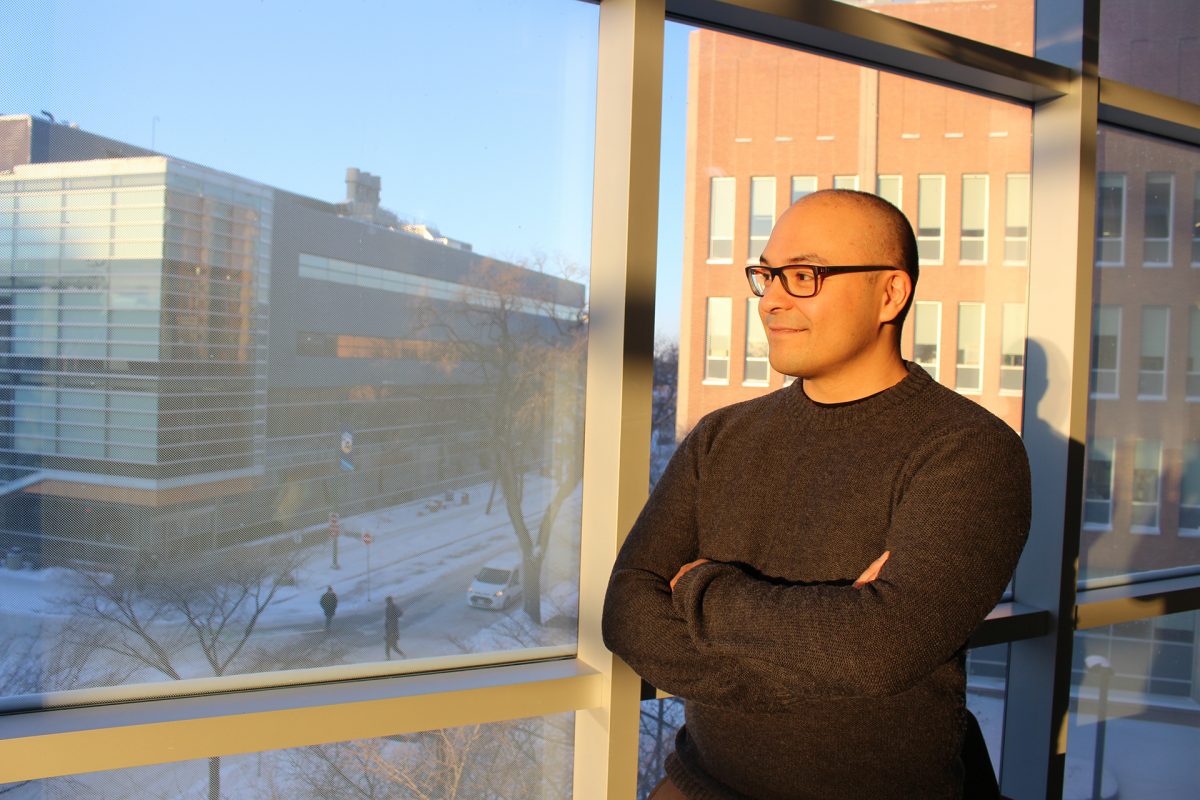
Marcello Nesca, a recent graduate of the VADA program and second year master’s student in community health sciences.
VADA program grad delights in data science
It’s not every day that you meet someone as enthusiastic about data science as Marcello Nesca, a second year master’s student in community health sciences.
Nesca is a recent graduate of the Visual and Automated Disease Analytics (VADA) program, which trains graduate students to translate complex health data into insights that can be used to improve the health of populations and support health professional decision making.
The program, a collaboration between the University of Manitoba and University of Victoria, was established in September 2017 with funding from the Natural Sciences and Engineering Research Council of Canada’s (NSERC) Collaborative Research and Training Experience (CREATE) program. Six master’s students and five PhD students have graduated from the program since it began in September 2017. The program plans to train upwards of 86 students over a six-year period.
Nesca’s research is focused on the development of a data quality framework and operational measures for unstructured text data in routinely collected electronic health data.
Why did you decide to apply to the VADA program?
As soon as I heard about the program, I thought, this should be the next step of my career. I’m currently completing my master’s in community health sciences with Dr. Lisa Lix, Canada Research Chair in Methods for Electronic Health Data Quality. Previously, I worked at a telecommunications firm conducting exploratory data analysis in their research department. I went back into academia because I wanted to do something more challenging. VADA is not just a research program, data science is at the forefront of very interesting things in many industries, and I love that. For me, the ability to discover new ways of conducting analysis is very interesting.
What is the focus of your research with the program?
What’s fantastic about the VADA program is that the assignments complemented your actual thesis work. Currently, we are breaking into the realm of unstructured text data, specifically pertaining to electronic medical records. I’m trying to build a framework on data quality for text data by asking questions such as “What are the specific data quality indicators for text that we can apply?”
What did you find most rewarding about your experience?
I love knowledge. I love gaining insight. This program gave me so much confidence in my ability to conduct data analysis for the future. As a result, this program exposed me to learning and understanding more statistical techniques involving not just health care but data sets in many different industries in general. I got a chance to understand the data science process better. I am interested in visualizing very complex topics for people who don’t have a data analysis background. In my previous career I had to do a lot of presentations to upper management, so we had to interpret it in the most user-friendly, accurate way for them.
How did completing an internship add to your learning and develop your skills?
This program not only gave me more confidence for my next career move, but also opened my eyes and gave me more confidence toward the future. I built skills in these programs through my internships. I learned how to code in new ways. I have a love for coding because it’s the ultimate customization for carrying out research analysis or visualizations. That’s where I feel that if I hone my skills, I should be able to do whatever it is requested of me for data analysis and visualization.
What was it like working with people from different backgrounds and concentrations?
The VADA program is interdisciplinary, we have the commonality in that we all like conducting data analysis. In summer school, we had to do a big data science challenge. I was paired up with two computer scientists, it was very fun. One big technical lesson was that while we speak different languages in our respective fields (computer sciences vs. applied statistics), we’re all achieving the same goal at the end of the day. This is what’s amazing about group work. We reconcile our differences through collaboration and consensus. At the end of the day, multi-disciplinary teamwork is always best for generating ideas and solving complex problems.
Are you interested in the intersection of data analytics and health? The VADA Program might be for you! Applications for new students are due January 31, 2020.
http://vada.cs.umanitoba.ca/admissions/application-form/
Read about other students’ experiences in the VADA program:
VADA program opens door to growing career possibilities in health data translation
VADA program offers valuable skills in disease prevention
Program enriches health data analysis and techniques






